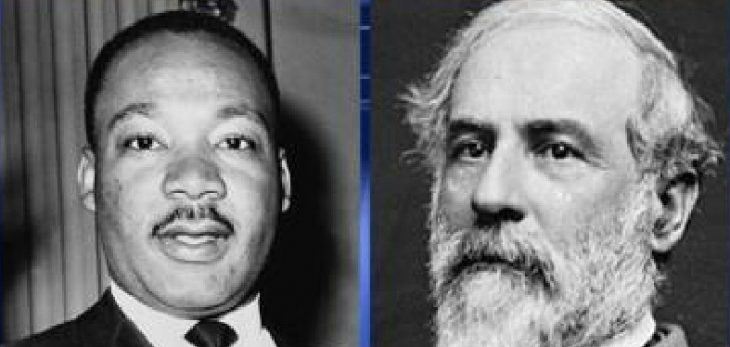After governor’s testimony, panel passes King-Lee separation
by March 2, 2017 2:10 pm 516 views

A bill that would separate Arkansas’ remembrances of Dr. Martin Luther King and Gen. Robert E. Lee passed the Senate Education Committee Thursday after Gov. Asa Hutchinson testified in favor of it.
Senate Bill 519 by Sen. David Wallace, R-Leachville, and Rep. Grant Hodges, R-Rogers, would make the third Monday in January an official state holiday honoring only King. The second Saturday in October would be Robert E. Lee Day, not a holiday but one of Arkansas’ “state memorial days to be commemorated by gubernatorial proclamation,” the bill says.
Arkansas is one of three states that celebrate the two men’s birthdays concurrently, the others being Alabama and Mississippi. The state began celebrating Lee’s holiday in 1947. In the 1980s after the King holiday became a national holiday, the state eventually combined the holidays, which occurred in close proximity.
Hutchinson said prior to this year’s legislative session that separating the holidays was one of his legislative priorities. An effort to separate the holidays in the 2015 session failed after it met resistance. Hutchinson supported the bill but did not make it a top priority.
Hutchinson told the committee that his great-great-grandfather, Col. Alexander Simpson Hutchinson of Nashville, Ark., fought for the Confederacy, the details of which he did not know until he became governor. But he said history flows and perspectives change.
“This does not change history but simply reflects a high regard for the importance of the civil rights movement that changed America for good,” he said.
Hutchinson displayed an oversized copy of a notice that appeared at the Capitol announcing that state offices would be closed Jan. 16 this year in honor of both the civil rights leader and the Civil War general.
“I suppose you can say we should just celebrate them together, but the fact is celebrating Martin Luther King on the same day as a Confederate general gives Arkansas a sense that you make a choice, and this choice diminishes the contributions of Dr. King,” he said.
Two senators on the committee spoke against the bill. Sen. Alan Clark, R-Lonsdale, said he has been a member of the NAACP and agreed the days should be separated. But he said his great-great-grandfather fought in the Civil War, was wounded in Chattanooga and spent six months in a Mississippi hospital, and he said Southerners should not be ashamed of their Confederate past. Told by Hutchinson that the October date coincided with Lee’s death, he questioned what other historical figure’s death is commemorated with a holiday besides Jesus.
Sen. Blake Johnson, R-Corning, said while King was fighting for individual rights, Lee was fighting for states’ rights. He said the best response is to keep the holidays together.
“I think the integration of these two histories is the best way to healing, not the separation, or segregation,” he said.
Hutchinson disagreed, saying, “I have no doubt that Gen. Lee was a man of conviction, and he prayed diligently about the decisions that he made, but history says that he was on the wrong side of that, and while we learn and we study, I don’t think you can equate those on the same day.”
Afterwards, Sen. Joyce Elliott, D-Little Rock, one of two African-Americans on the committee, said the annual notice posted at the Capitol featuring King and Lee is a reminder of America’s past.
“Every time I see it, every year I see it, it’s like a stab in the heart. … Having to say in order to celebrate (King), we also have to celebrate someone who fought on the side of something that was totally opposite of what Dr. King was about – yeah, I say, straight ahead, it’s a hurtful thing, and every year we get to relive it,” she said.
The bill also requires the commissioner of education to emphasize, as part of already existing material on African-American history, the work of American civil rights leaders including King. The material would be taught alongside corresponding state and federal holidays and at other times.
It also requires the Department of Education to develop materials relating to Arkansas and the Civil War. The material would emphasize “civilian and military leadership during the period and how the lessons of that era can inform contemporary society.”
